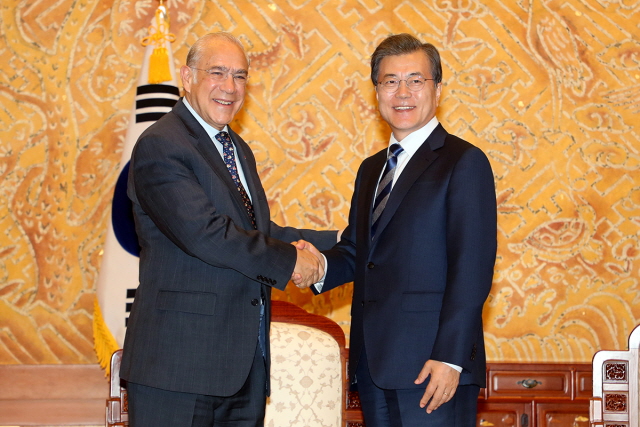이 웹사이트는 제19대 대통령 임기 종료에 따라 대통령기록관이 「대통령기록물 관리에 관한 법률」에 의해 이관받아 서비스하는 대통령기록물입니다. 자료의 열람만 가능하며 수정 · 추가 · 삭제는 불가능합니다.
다만, 「개인정보보호법」에 의하여 개인의 정보를 보호받기 원하시는 분은 관련 내용(요청자, 요청내용, 연락처, 글위치)을 대통령 웹기록물 담당자(044-211-2253)에게 요청해 주시면 신속히 검토하여 조치해 드리겠습니다. 감사합니다.
SPEECHES & REMARKS
BRIEFINGS

President Moon Jae-in met with Secretary-General of the OECD Angel Gurria at Cheong Wa Dae for 30 minutes from 3:30 this afternoon. They discussed key international economic issues, such as inclusive growth, job creation, digitization and response to an aging society, all of which constitute global challenges. President Moon explained to the OECD Secretary-General the Korean Government’s effort to create decent jobs, respond to the aging population and ease regulations.
Secretary-General Gurria gave the President a report recently compiled by the OECD “Digitalization: An Enabling Force for the Next Production Revolution in Korea.” President Moon thanked him with a comment that the report would be a good reference for Korea’s endeavors to develop sustainable growth engines while maintaining its comparative advantage as a digital powerhouse.
Secretary-General Gurria noted that Korea, which marked the 20th anniversary last year of its accession to the OECD, has emerged as a reliable partner for the international organization by taking the lead in setting various policies and norms. President Moon gave high marks to the Secretary-General, who is serving his third consecutive terms, for his contributions to enhancing the OECD’s role as a global policy network through the expansion of cooperation between the OECD and major international consultative forums such as the G20 as well as non-member states.
The Secretary-General said that the directions of many priority tasks President Moon is pushing ahead with were in line with the essential elements of the OECD Better Life Initiative, a fact that pointed to much room for future cooperation between Korea and the OECD.
In reply, President Moon said that his Administration was making its best efforts to accomplish high-priority tasks such as the realization of inclusive growth and the addressing of polarization. Mentioning that the uneven distribution of the benefits of economic growth in the past was attributable to the aggravation of social polarization in Korea, President Moon said he looked forward to continuing close cooperation with the OECD to address the problem.
Sharing a common understanding that Korea`s low birth rate and aging population has become grave issues, the President and the Secretary-General saw eye to eye on the urgent need of tackling them.
Secretary-General Gurria pointed out that it was a dishonor for Korea and Mexico, his home country, to have the longest work hours among OECD members and that their productivity was lingering at half the OECD average, adding that there needed to be joint efforts to solve the problem. Sharing an understanding on the issue, President Moon said the Korean Government was making endeavors to reduce work hours and improve productivity. Mentioning that Korea had the problem of young adults having difficulties in getting jobs while small and medium-sized enterprises were having a hard time in finding workers as a result of the mismatch between demand and supply in the labor market, the President went on to say that the Korean Government was striving to solve the issue.
Secretary-General Gurria highlighted the fact that there exists a dual structure that consists of regular workers and irregular workers in the Korean labor market. Then, the Secretary-General stressed that efforts had to be made to help those who lose jobs as a result of the Fourth Industrial Revolution find work in a new field and that vocational training would be important in that regard.
Finally, President Moon said Korea would be able to play a role as a bridge between the OECD and Southeast Asian nations by expanding its part in the OECD’s Southeast Asian programs. The President went on to say that it was necessary to further strengthen cooperative relations between Korea and the OECD.



